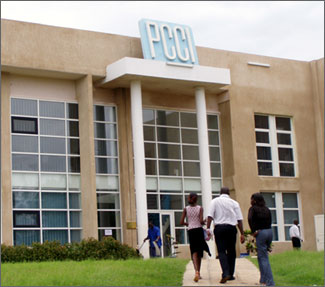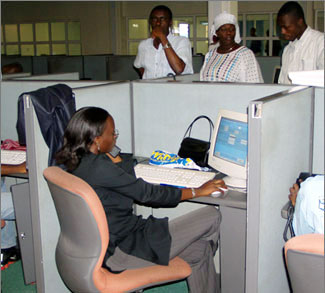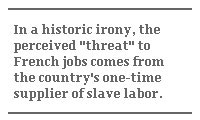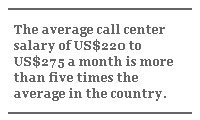Don’t Tell Anybody It’s Africa Calling
Don't Tell Anybody It's Africa Calling

DAKAR: In the blue-carpeted office of the PCCI call center, young men and women sit before banks of glowing computer screens, murmuring softly into the telephone. The French callers at the other end of the line don't realize that their call is being answered from 2,500 miles away in Dakar, Africa – from a cement and glass building tucked away at the end of a dirt road in a suburb of the Senegalese capital. Welcome to the latest phase of globalization touching Africa.
An undersea electronic highway along the coastline, along with a plentiful supply of French-speaking workers, has enabled Senegal to break into Europe's emerging call center market. But the poverty-stricken country's weak infrastructure and the protectionism of its former colonial power France remain major obstacles to a prosperous future. In a historic irony, the perceived "threat" to French jobs comes from the country's one-time supplier of slave labor.

Some 600 years ago, Europeans landed on Senegal's sandy beaches in search of slaves and gold, and dragged the country into the most sordid phase of globalization. Even when slavery was abolished in the mid-19th century, French colonial rulers forced former slaves into the army. The so-called "Tirailleurs Senegalais" fought for France as late as the 1950s. Now France, worried about its own rising youth unemployment, has little use for the former colony and its unemployed workers.
In the face of intensified global competition, French companies have sought ways of cutting costs by off-shoring production and outsourcing some business processes, especially client support and promotion. This is where a French-speaking former colony, like Senegal, or protectorates, like Morocco and Tunisia, come in. Some 10,000 of France's 250,000 call center jobs have been outsourced to these Francophone countries.

The combination of a French education and a high unemployment rate (40 percent) lends Senegal a grim competitive advantage over other Francophone countries hungry for outsourced jobs. (Unemployment is 10 percent in Mauritius, 15 percent in Tunisia, and 20 percent in Morocco) Senegal-based call centers now provide receptionists for French doctors, lawyers, and bankers. Tele-operators of the Premium Contact Center International (PCCI), for example, also enlist new customers for telephone and internet service providers and conduct telephone surveys for clients.
"We launched our operation by offering a price 20 to 40 percent cheaper than in France," says Abdoulaye Sarre, the soft-spoken CEO of PCCI. He explains that while call center jobs in France offer poor pay and low esteem, in Senegal they hold potential for a whole new career in client counseling with higher than average salaries. Senegal's relatively solid telecommunication infrastructure and location along the path of the transatlantic undersea fiber-optic cable (which links Europe to Latin America) allow companies like PCCI to tap directly into the internet backbone. By using inexpensive voice-over internet telephony (VOIP), the company has significantly lowered its costs.

PCCI started in 2002 with between 30 and 40 employees; it now employs about 1300 people. The client base has risen from a mere couple to a dozen, ranging from telecom operators to internet service providers to mail-order companies. Sarre, for his part, says growth is propelled more by quality than cost. The companies risk their brand name by outsourcing customer care to vendors like PCCI and will do so only with the assurance of quality service.
Once hired, the PCCI employees are trained in neutral accented French and general knowledge about France. At the end of the training, an employee should also be able to recognize regional accents.
Further, workers must be aware of the latest regional developments; for instance, Sarre explains, if there were a major accident – a factory explosion, say – in Tolouse, then callers should know not to dial that area. Every morning before the employees sit at their computers and telephones, they are briefed on two or three major developments in France and check on the regional weather reports. "Today it is raining a lot in the Calais region, and people tend to stay indoors so it is probably a good time to call," explains Sarre.

The average call center salary of US$220 to US$275 a month is more than five times the average in the country. Understandably, then, the call centers attract the best and brightest of the university graduates. At PCCI, the salary can be supplemented by the classic capitalist tool of incentives. If a telemarketer surpasses the assigned target, a white envelope containing a crisp CFA 5,000 bill (about US$10) is ceremoniously handed over amidst general applause in the hall.
Senegal, with its US$510 per capita GDP, ranks 155th among the 174 poorest countries listed in the human development index. The call center business may be its first opportunity to break into the modern world. One of the earlier gifts of globalization, peanuts, introduced from the New World, has until recently been Senegal's number one export earner. Fishing, which employs close to a million people, has just overtaken peanuts as the prime export. But the European Union's fishing policy, for all its proclaimed desire to help African poverty, has seriously damaged Senegal's fishing industry. In a recent report the UN Development Program dryly notes that "after 15 years of 'cooperation' with the European Union, Senegal's fisheries sector is in deep crisis. Stocks have been severely depleted, disrupting the artisan sector, pushing up fish prices in local markets and jeopardizing supplies to canning factories producing for export."
Senegal's attempt to develop a poultry industry has also been blighted by European dumping of chicken legs and other parts that Europeans don't eat. A drive through Dakar's suburbs reveals desolate and abandoned chicken farms. This influx of cheap imported goods has deeply affected the local economy: The streets of Dakar and its squalid periphery teem with thousands of unemployed young men and women looking for jobs or just wandering in the hope of some opportunity. Unsurprisingly France's attempt last year to stop call centers abroad brought an angry response from the Senegalese media.
Even though only 7,700 jobs in France were outsourced to Francophone countries in 2003, the mood in France is nasty. In October of last year, the then minister of Economy and Finance, Nicolas Sarkozy, proposed strangling call center outsourcing by requiring tele-operators to announce upfront where they were calling from. The assumption was that a call from Montpellier answered by some "Fatima from Dakar" would make people hang up. Fortunately for the ex-colonies of France, that law has not passed. But outsourcing continues to be a contentious issue, and companies practice it with total discretion. None of the call centers would identify their French clientele by name, and young Senegalese answering calls affect a Parisian accent, identifying themselves as "Jean" or "Monique."
Indeed, the white-columned PCCI building with manicured lawns stands out as a glimmer of hope against a backdrop of poverty. Sarre, who has a MBA from Montreal University, is hopeful that the company will continue to grow, perhaps one day serving Senegalese as well as French clients. He plans to upscale with data processing, software development, and software maintenance. "My dream is to be like India's Infosys and Wipro," says Sarre.
The hurdles in the path of that dream are daunting. The fact remains that only two percent of Senegal's 10.6 million people have access to the internet. "We have passed the break-even point in monthly terms," says Sarre, "but we are still in the red." Indeed, it will take a while to get full returns on the company's US$12 million investment.
Nayan Chanda is Editor of YaleGlobal Online and Director of Publications at the Yale Center for the Study of Globalization.